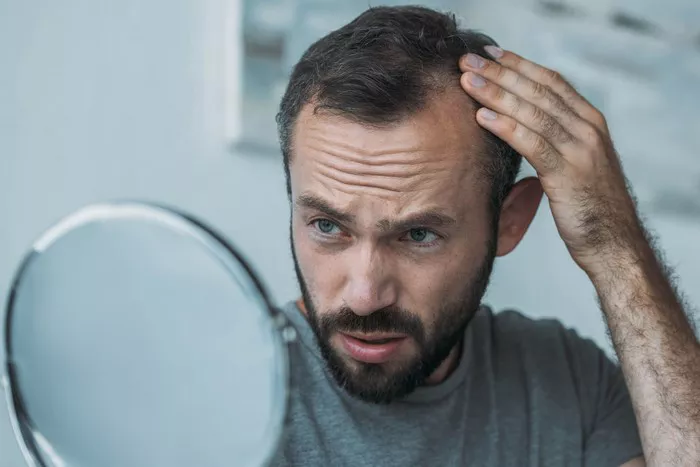Hair loss is a common concern for many individuals, with various factors contributing to its onset and progression. Among these factors, testosterone, a hormone typically associated with masculinity and muscle growth, has been implicated in hair loss, particularly in men. But can high testosterone levels actually cause hair loss? In this article, we delve into the science behind testosterone and its relationship to hair loss, exploring the evidence, mechanisms, and implications.
Understanding Testosterone
Before exploring its potential effects on hair loss, it’s crucial to understand what testosterone is and its role in the body:
Primary Male Hormone: Testosterone is the primary male sex hormone, although it is also present in smaller amounts in females. It plays a crucial role in the development of male reproductive organs, secondary sexual characteristics, and muscle mass.
Androgen Hormone: Testosterone belongs to a group of hormones known as androgens, which regulate various physiological processes, including sexual development, libido, mood, and metabolism.
Converted to DHT: In the body, testosterone can be converted into dihydrotestosterone (DHT) by an enzyme called 5-alpha reductase. DHT is a more potent androgen that plays a key role in the development of male characteristics, but it is also implicated in conditions such as enlarged prostate and male pattern baldness.
Can High Testosterone Cause Hair Loss?
While testosterone itself may not directly cause hair loss, its derivative DHT has been strongly associated with male pattern baldness, also known as androgenetic alopecia. Here’s how high testosterone levels can contribute to hair loss:
Increased DHT Production: High levels of testosterone in the body can lead to elevated DHT production, especially in individuals who are genetically predisposed to hair loss. DHT binds to receptors in hair follicles on the scalp, leading to miniaturization of the follicles and eventual hair thinning and loss.
Sensitivity of Hair Follicles: In individuals with a genetic predisposition to androgenetic alopecia, hair follicles on the scalp may be more sensitive to the effects of DHT. This increased sensitivity can accelerate the hair loss process, leading to a characteristic pattern of thinning hair and receding hairline.
Hormonal Imbalance: High testosterone levels may disrupt the delicate balance of hormones in the body, including other androgens and hormones such as estrogen. Imbalances in hormone levels can affect various physiological processes, including hair growth cycles, leading to excessive shedding and thinning of hair.
Stress Response: Elevated testosterone levels, particularly during periods of stress or hormonal fluctuations, can trigger an inflammatory response in the scalp. Chronic inflammation may contribute to hair follicle damage and interfere with the normal hair growth cycle, leading to hair loss.
Factors Influencing Testosterone Levels and Hair Loss
Several factors can influence testosterone levels and their impact on hair loss:
Genetics: Genetic factors play a significant role in determining an individual’s susceptibility to androgenetic alopecia. Individuals with a family history of hair loss are more likely to experience hair thinning and baldness, even with normal testosterone levels.
Age: Testosterone levels naturally decline with age in both men and women. However, age-related changes in hormone levels, coupled with genetic predispositions, can exacerbate hair loss in susceptible individuals.
Lifestyle Factors: Lifestyle factors such as diet, exercise, stress, and sleep patterns can influence testosterone levels and hormone balance. Poor dietary choices, sedentary lifestyles, chronic stress, and inadequate sleep can disrupt hormonal equilibrium and contribute to hair loss.
Medical Conditions: Certain medical conditions, such as polycystic ovary syndrome (PCOS) in women and hormonal imbalances in men, can lead to elevated testosterone levels and hair loss. Treating the underlying medical condition may help alleviate hair loss symptoms.
Conclusion
In conclusion, while high testosterone levels themselves may not directly cause hair loss, the conversion of testosterone to DHT and its subsequent effects on hair follicles can contribute to androgenetic alopecia in susceptible individuals. Genetic predisposition, hormonal imbalances, and lifestyle factors play significant roles in determining the extent of hair loss experienced by individuals with high testosterone levels. Understanding the complex interplay between testosterone, DHT, and hair follicle sensitivity is crucial for developing effective strategies for preventing and managing hair loss. By addressing underlying hormonal imbalances, adopting healthy lifestyle habits, and seeking appropriate medical interventions, individuals can mitigate the impact of high testosterone on hair health and maintain a healthy head of hair for years to come.
What To Eat To Avoid Hair Loss

